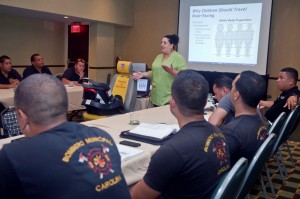
Puerto Rican law requires fire stations to have at least one child passenger safety technician on staff to educate parents on the proper installation of the safety seats for their children as well as provide safety seats for families in need.
Irene Rodriguez, assistant research specialist in the Center for Transportation Safety, has traveled to Puerto Rico for the last ten years to teach the National Highway Traffic Safety Administration National Child Passenger Safety Certification Training (CPST) course. Her latest trip was this September.
Due to language barriers on the island, Bilingual certified instructors like Rodriguez must teach the course to ensure that participants are learning the terminology in English and in Spanish so they can be better equipped to educate parents in both languages.
Currently, 65 of the 78 municipalities in Puerto Rico employ one or more certified technicians.
“The commitment of the Comision para la Seguridad en el Transito (Traffic Safety Commission) in collaboration with the Cuerpo de Bomberos (Fire Department) to maintain certified technicians in 65 of the 78 municipalities on the island is remarkable,” says Rodriguez.
Rodriguez says the ultimate beneficiaries are the children and their parents. Puerto Rico recently established a process whereby new parents are ‘certified’ at their local fire stations, meaning they are educated on correct child safety seat installation and use. The certification is requested by the delivering hospital prior to sending the baby home.
“To provide this service at the local level, regardless of the size of the city, is a large undertaking,” says Rodriguez. “Currently Puerto Rico has only one CPST instructor in residence.” Technicians and the instructor rely on assistance from Rodriguez and others to keep their credentials up to date and to train new technicians.